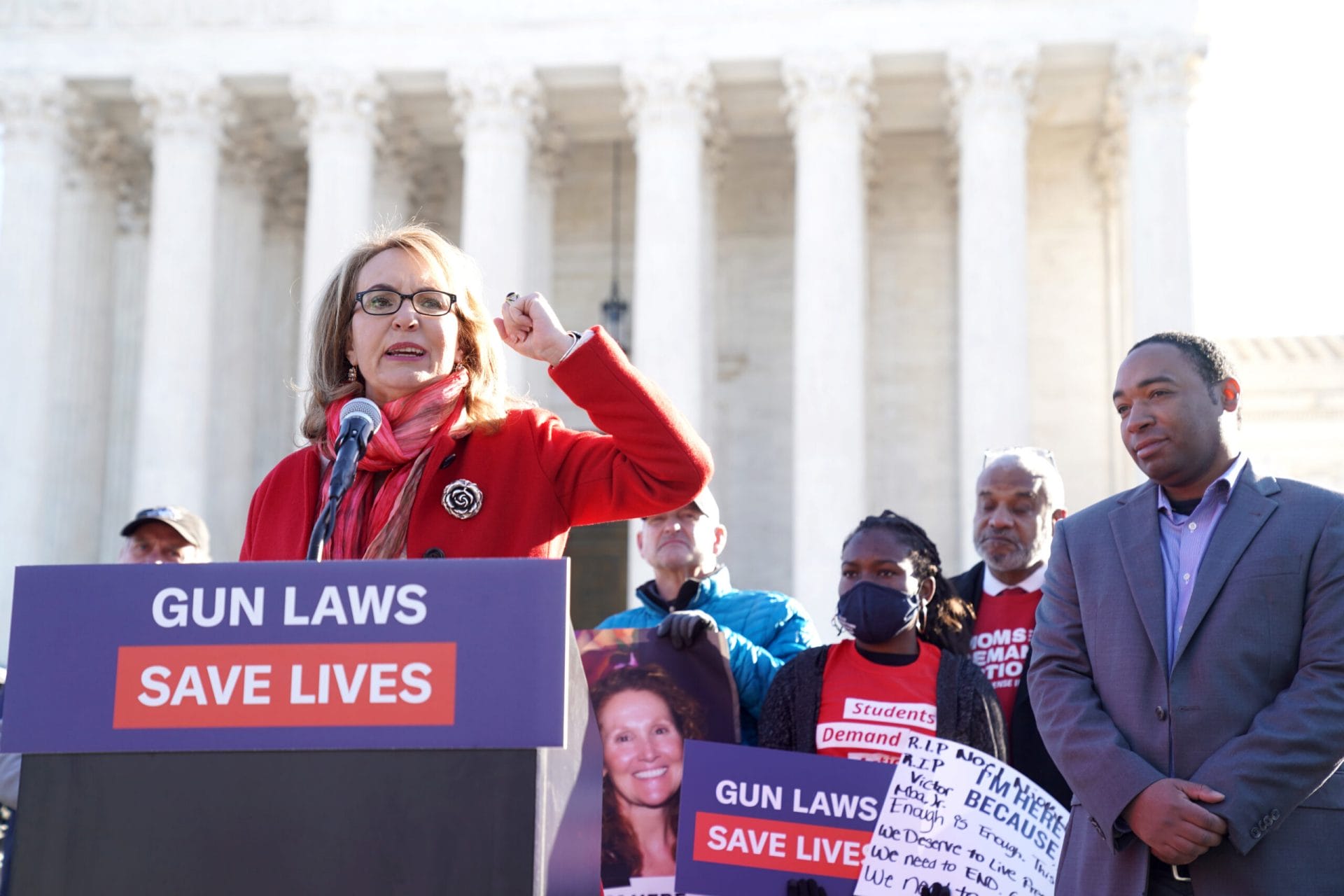
Giffords Law Center Gun Law Trendwatch: 2021 Year-End Review
A Roundup and Analysis of the Year’s State Firearm Legislation
Americans want solutions to spiking gun violence. Many legislators are passing extremist gun laws like permitless carry instead.
Six days into 2021, armed insurrectionists stormed the United States Capitol, following a year of armed demonstrations against gun safety laws, Covid policies, election results, and peaceful racial justice protests.
These armed extremists do not represent most Americans, the majority of whom agree with Covid precautions and stronger gun laws and are more concerned with protecting voting rights than alleging voter fraud. Yet in 2021, many legislators chose to take radical positions on issues of major social importance, meaning that increasingly, Americans are living under laws that reflect the positions of the minority, not the majority. Gun laws are no exception.
For example, even though Iowans overwhelmingly support background checks on all gun purchases, in 2021, Iowa repealed its law requiring background checks on purchases of handguns from unlicensed sellers. Similarly, in Texas—where 61% of all voters and 54% of gun owners say they would never vote for a candidate who opposes universal background checks—a background checks bill (HB 118) was swiftly defeated in the state legislature.
The Rise of Permitless Carry and Nullification
Meanwhile, Texas’s Republican-led legislature passed and Governor Greg Abbott signed HB 1927, which allows people without a background check or safety training to carry a hidden, loaded gun in public—even though 59% of Texans oppose permitless carry.
The same bill failed in 2019 when Republican Speaker of the House Dennis Bonnen failed to advance it, saying “I could no longer watch as legislators and their families are incessantly harassed by fanatical gun-rights activists….Their goal is to eradicate sensible gun policies by allowing anyone to carry a gun without a license and proper training.”
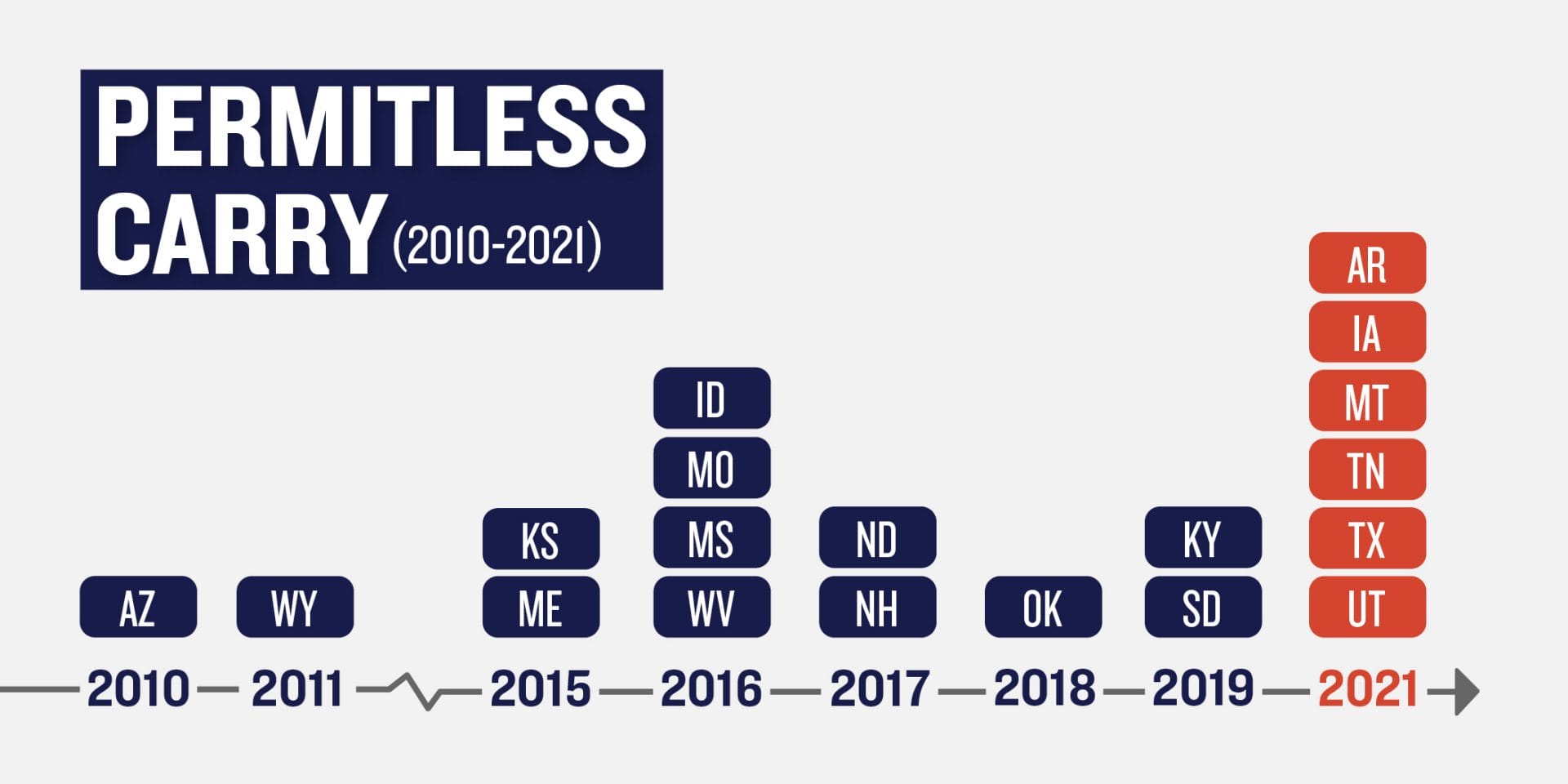
Even though the data is abundantly clear that weaker concealed carry laws are correlated with higher rates of violent crime, enacting permitless carry has been a gun lobby priority for years. In 2021, five additional states—Arkansas, Iowa, Montana, Tennessee, and Utah—repealed laws requiring permits to carry concealed guns. Twenty-one states now allow individuals to buy and carry guns into public spaces without any background check or safety training—as compared to just four states in 2014. Recognizing the extremism of permitless carry, Louisiana’s and Pennsylvania’s governors vetoed permitless carry bills this year.
Also in 2021, extremist legislators in 12 states passed laws to prevent America’s modest federal gun laws from being enforced. Arkansas went as far as making state and federal officials criminally liable for assisting with the enforcement of federal law. Missouri passed a law subjecting law enforcement officers to a $50,000 fine—more than a year’s salary for many—for the same conduct.
One police chief explicitly said that the new law benefits individuals who have committed crimes, while another resigned, stating the law appears to allow “individual police officers to be sued for even good-faith, justified seizures of firearms in emergency circumstances [and]…will chill the legitimate peace-keeping duties of police.” Shortly after Missouri’s law was signed, state prosecutors withdrew from numerous federal gun cases. Law enforcement officers have reported failing to refer to federal prosecutors a man who shot at his girlfriend in public.
Even more astonishing is the fact that legislators are passing these laws when gun violence is spiking and making news daily. Provisional data released by the CDC shows that more than 45,000 people were killed by guns in 2020, a level of gun deaths not seen in decades.
Thanks to Courageous Legislators, Progress Marches On
Fortunately, however, many legislators are responding to increasing extremism and violence with evidence-based, effective policies. Twelve states and the District of Columbia took significant steps to invest heavily in community violence intervention programming or create offices dedicated to violence prevention. States also have the opportunity—which a number have already taken advantage of—to use billions of dollars in federal funding from the American Rescue Plan Act to fund these programs.
Fourteen states enacted significant reforms to their policing laws, and three states enacted laws to protect the exercise of democracy from firearm intimidation: Virginia prohibited guns at the polls, Oregon and Virginia prohibited guns at state capitols, and Washington State prohibited the open carry of firearms at public demonstrations. Legislators in Colorado, Oregon, and Virginia also gave local governments, K-12 schools, and institutions of higher education the power to regulate firearms on their properties.
The surge in gun buying in 2020 also emphasized the need for a strong and comprehensive background checks system. Colorado, Oregon, and Maine passed laws to help keep guns inaccessible to minors or people prohibited from gun possession. Colorado closed a gap that allowed people to obtain a gun before a background check cleared and prohibited people convicted of hate crimes from firearms possession. Illinois and Virginia also passed laws strengthening background checks. Maryland passed a law requiring all gun sales to be subject to a background check, while New York passed a first-of-its-kind law that allows people harmed by guns to sue firearms manufacturers and dealers.
Legislators determined to pivot away from extremism must follow the examples of these states and enact policies to reduce gun violence based on evidence, not ideology. To truly move our states away from the trajectory of increasing extremism and gun violence, Americans have to show legislators that they cannot win elections by taking radical positions that cost lives. Lawmakers should pledge to follow the will of their constituents, enact evidence-based policies, and put the safety of our children and communities above all else.
MEDIA REQUESTS
Our experts can speak to the full spectrum of gun violence prevention issues. Have a question? Email us at media@giffords.org.
Contact
SPOTLIGHT
GUN VIOLENCE STATISTICS
Explore facts, figures, and original analysis compiled by our experts. To end our gun violence crisis, we need to better understand where, how, and why violence occurs.
Learn MoreGun Safety Victories
In 2021, 27 states and Washington DC passed 75 strong bills, bringing the total number of significant laws passed since the massacre in Parkland in 2018 to 255. States have passed more than 465 laws since the Sandy Hook shooting in 2012.
Background Checks
Four states improved background checks in the following ways: prohibiting gun transfers until a background check clears (Colorado HB 1298), verifying gun purchase permits remain valid (Illinois HB 562), requiring background checks on long gun purchases (Maryland HB 4/SB 208), and extending the time the state police has to conduct a background check from three to five business days (Virginia HB 2128).
Child Access Prevention/Safe Storage
Four states made it harder for minors and/or other unauthorized users to access firearms stored in the home: Colorado (HB 1106), Hawaii (HB 31), Maine (HB 564), and Oregon (SB 554).
Community Violence Intervention (CVI) Programing
The following 12 states and the District of Columbia committed significant funding for local community violence intervention and prevention programing or created offices dedicated to violence prevention: California (AB 128), Colorado (HB 1299), Connecticut (HB 5677), Illinois (HB 2791, SB 2017, and SB 2800), Maryland (HB 588/SB 708), Massachusetts (HB 4002), Minnesota (via executive action), New Jersey (SB 2022), New York (AB 3006, SB 2503), Pennsylvania (HB 1348, SB 255), Virginia (HB 7001c), and Wisconsin (via executive action).
Concealed Carry Licensing
Illinois passed a law that requires state police to continuously monitor relevant state and federal databases to ensure license holders have not become prohibited (HB 562). Louisiana required concealed carry applicants to demonstrate shooting proficiency and safe handling of a handgun (HB 48).
Domestic Violence
The following four states and the District of Columbia (B 181) enacted laws that make it more difficult for people who commit domestic abuse to access firearms or easier for people who survive domestic abuse to obtain firearm-prohibiting protective orders: California (AB 1057/SB 538), Colorado (HB 1255), Virginia (HB 1992), and Washington (HB 1320).
Extreme Risk Protection Orders
Three states strengthened their laws allowing law enforcement and, in some states, family and household members, to petition a court to temporarily remove guns from a person who poses a substantial risk of violence: California (AB 1057/SB 538), Connecticut (HB 6355), and Nevada (SB 6).
Firearm Prohibitions
The following five states prohibited additional categories of people who are at high risk of committing violence with guns from being able to purchase or possess firearms: Arkansas (HB 1741), Colorado (HB 1298), Delaware (HB 124), Montana (HB 333), and New York (SB 5000).
Ghost Guns
Four states passed legislation to regulate the possession or sale of unfinished firearm frames and receivers and/or unserialized firearms: Delaware (HB 125), Hawaii (HB 1366), Nevada (AB 286), and New York (SB 13 and 14).
Gun Dealer Regulations
Colorado (HB 1106) and Oregon (SB 554) required gun dealers to provide locking devices with firearms, joining 12 states that have this requirement for some or all firearms.
Guns in K-12 Schools
Rhode Island (HB 5555/SB 73) prohibited people with concealed carry permits from bringing loaded firearms onto K-12 school campuses.
Liability Law
New York passed a first-of-its-kind law (SB 7196) that allows people to sue gun dealers and manufacturers when they engage in misconduct or fail to act responsibly, in spite of a federal law that provides gun dealers and manufacturers with unprecedented immunity from consumer lawsuits.
Lost/Stolen Firearms
The following two states passed laws requiring gun owners to report the loss or theft of a firearm to local law enforcement: Colorado (SB 78) and Oregon (SB 554).
Preemption Repeal
Colorado became the first state in the nation to repeal its comprehensive firearms preemption statute and allow local governments, K-12 school districts, and colleges and universities to broadly regulate guns (SB 256). Oregon also returned authority to K-12 school districts and colleges to regulate guns on their properties (SB 554), and Virginia did the same for K-12 school districts (HB 1909).
Protecting Democracy
Oregon (SB 554), Virginia (SB 1381), and Washington (SB 5038) prohibited guns in and around their state capitol buildings. Virginia’s bill also prohibits guns at polling places, meeting places of the electoral board, and buildings where a recount is occurring. Washington’s bill also prohibits openly carrying a firearm within 250 feet of a permitted demonstration.
Records Reporting
Missouri (SB 71) and Nevada (SB 70) passed laws that require records of people prohibited from possessing firearms to be sent to federal background check databases.
Relinquishment
Four states created or improved processes to remove firearms from people after they have become prohibited by law from possessing them: Arkansas (HB 1741), California (SB 320), Colorado (HB 1255), and Illinois (HB 562).
Research and Data
Maine enacted a law requiring the Maine Center for Disease Control and Prevention to report annually on firearm homicides, suicides, accidental deaths, and hospitalizations, as well as the make and model of the firearms used in those events (HB 1026). New York created a state firearm violence research institute to support research, increase reporting on gun violence, and advise policymakers (SB 2981).
Suicide Prevention
Delaware established “The Gun Shop Project” to create and distribute educational materials at gun stores to reduce the risk of suicide (HB 55), and Utah created a voluntarily restricted list that a person can place themselves on to be prevented from purchasing firearms (HB 267).
Tracing/Trafficking
Seven states enacted laws that would improve efforts to trace and/or prevent the trafficking of firearms: California (AB 1191), Colorado (HB 1255), Illinois (HB 562), Indiana (HB 1558), Rhode Island (HB 5386/SB 416), Texas (SB 162), and Virginia (HB 1992).
HERE TO HELP
Interested in partnering with us to draft, enact, or implement lifesaving gun safety legislation in your community? Our attorneys provide free assistance to lawmakers, public officials, and advocates working toward solutions to the gun violence crisis.
CONTACT US

SPOTLIGHT
GUN LAW SCORECARD
Every year, the data is clear: States with strong gun laws have less gun violence. See how your state compares in our annual ranking.
Read MoreGun Lobby Victories
While courageous advocates helped block many dangerous gun lobby bills, states passed the following reckless laws in 2021.
Banning Enforcement of Federal Gun Laws
Six states declared federal gun laws unenforceable in their states: Arkansas (HB 1637), Montana (HB 258), North Dakota (HB 1164 and 1383), Oklahoma (HB 1236/SB 631), Utah (HB 415), and West Virginia (HB 2694).
Five states prohibited state or local governments from using public funds or resources to enforce federal gun laws: Arizona (HB 2111), Idaho (SB 1205), Montana (SB 277), South Carolina (HB 3094), and Texas (HB 957 and 2622).
Texas passed a law purporting that federal laws regulating gun silencers are unenforceable in the state. This law, which would strip a locality of state funding for enforcing a federal silencer law, also repealed existing state laws regulating silencers (HB 957).
Arkansas made state officials criminally liable for violating the ban on enforcement of federal gun laws (HB 1957/SB 59). Missouri made law enforcement officers and agencies, public officials, and private individuals personally liable in civil court and subject to a $50,000 fine for enforcing federal gun laws (HB 85). Tennessee passed a law making any local or state employee who helps enforce a federal gun law subject to termination, and any locality found to have helped enforce a federal gun law subject to the loss of state funding (SB 557).
Background Checks Repeal
Following a multi-year effort by the gun lobby, Iowa (HB 756) repealed its permit-to-purchase law that required individuals to obtain a permit and background check when buying a handgun from an unlicensed seller. The same bill also weakened background checks conducted by gun dealers.
Concealed Carry Expansion
Seven states expanded where and how hidden guns can be carried or who can carry them, or otherwise weakened laws regulating concealed carry: Alabama (SB 308), Kansas (HB 2058), Mississippi (SB 2253), North Dakota (HB 1450 and 1293), Oklahoma (HB 1630/SB 106), West Virginia (HB 2793), and Wyoming (HB 116).
Guns at Protests
Florida (HB 1) created the ambiguous crime of “mob intimidation,” making it more likely that people exercising their First Amendment rights will face criminal prosecution.
New Hampshire changed its law to state that displaying a firearm in and of itself is never reckless conduct (HB 195), and South Carolina repealed a provision allowing a locality to regulate the public brandishing of firearms during a period where there is a demonstrated potential for riots (HB 3094).
Guns in Public Spaces
The following eight states passed laws that allow more guns into more public spaces: Arkansas (SB 306, 573, and 555), Florida (HB 259), Iowa (HB 756), Montana (HB 102), North Dakota (HB 1297), Oklahoma (SB 646 and 672), Tennessee (SB 765), and Texas (HB 1920).
Guns in Schools
Montana passed a law allowing guns in K-12 schools and on college and university campuses, though this provision was subsequently declared unconstitutional by a state trial court (HB 102). Texas expanded the ability of marshals to carry guns on higher education campuses (HB 781/SB 741).
Permitless Carry
Six states repealed laws requiring a permit and background check to carry hidden, loaded guns in public: Arkansas (HB 1898), Iowa (HB 756), Montana (HB 102), Tennessee (SB 765), Texas (HB 1927), and Utah (HB 60).
Stand Your Ground
Arkansas (SB 24), North Dakota (HB 1498), and Ohio (SB 175) created Stand Your Ground laws that allow people to use deadly force against others even if they could safely retreat from the conflict. South Dakota (HB 1212) and Utah (HB 227) passed laws making it harder to prosecute people who kill others and later claim self defense.
Other Dangerous Laws
Arizona (SB 1382) and Iowa (HB 621) created state laws immunizing gun dealers and manufacturers from product liability lawsuits. North Dakota added ammunition sellers to the types of gun businesses immunized from lawsuits (HB 1396).
Iowa passed a law that will put on the ballot a question of whether all gun laws should be reviewed using the highest form of judicial review, strict scrutiny (SJR 7).
South Carolina passed a law allowing people with concealed carry permits to openly carry handguns wherever concealed carry is allowed (including bars and parks) and in vehicles (HB 3094).
Tennessee passed a law prohibiting the creation of any sort of gun owner registry by the state or local governments and authorizing private individuals to sue government officials who violate the state’s preemption law or gun registry ban (HB 902).
JOIN THE FIGHT
Gun violence costs our nation 40,000 lives each year. We can’t sit back as politicians fail to act tragedy after tragedy. Giffords Law Center brings the fight to save lives to communities, statehouses, and courts across the country—will you stand with us?

LItigation
the courts
Explore our work defending lifesaving gun laws in the courts and fighting to debunk the gun lobby’s dangerous arguments about the Second Amendment.
Defeated Gun Lobby Bills
In 2021, gun safety advocates prevented gun lobby–backed bills in the following categories from becoming law in 15 states.
Permitless Carry
This year, bills to repeal concealed carry permit requirements—a gun lobby priority—failed in Alabama, Florida, Indiana, Louisiana (veto), Pennsylvania (veto), and Virginia.
Guns on Campus
The gun lobby continually attempts to force colleges and universities to allow guns on campus. Campus carry bills failed in Colorado, Florida, Kentucky, Missouri, Nevada, and Wyoming.
Guns in K-12 Schools
Despite the evidence that the presence of guns makes students and teachers less safe, after each school shooting, legislators friendly to the gun industry predictably call for laws arming teachers and other civilians. This year, bills to allow guns in K–12 schools failed in Arizona, Colorado, Mississippi, Missouri, Texas, Virginia, and West Virginia.
Nullification Individual Liability
Bills that would have made law enforcement officers or other government officials personally liable for criminal or civil penalties for helping to enforce federal gun laws were defeated in Alabama, Arizona, Florida, Kentucky, Louisiana, Mississippi, Texas, and West Virginia.
2021 started off with one of the most undemocratic events in our country’s history, and gun lobby groups and extremist legislators spent the next 12 months trying to increase the prevalence of guns in public places. We must not waver in our resolve to build a safer country where every family and every community is free from the fear of gun violence. Together, we can stand up to special interests and pass gun laws supported by the vast majority of the American people.
SUPPORT GUN SAFETY
We’re in this together. To build a safer America—one where children and parents in every neighborhood can learn, play, work, and worship without fear of gun violence—we need you standing beside us in this fight.
